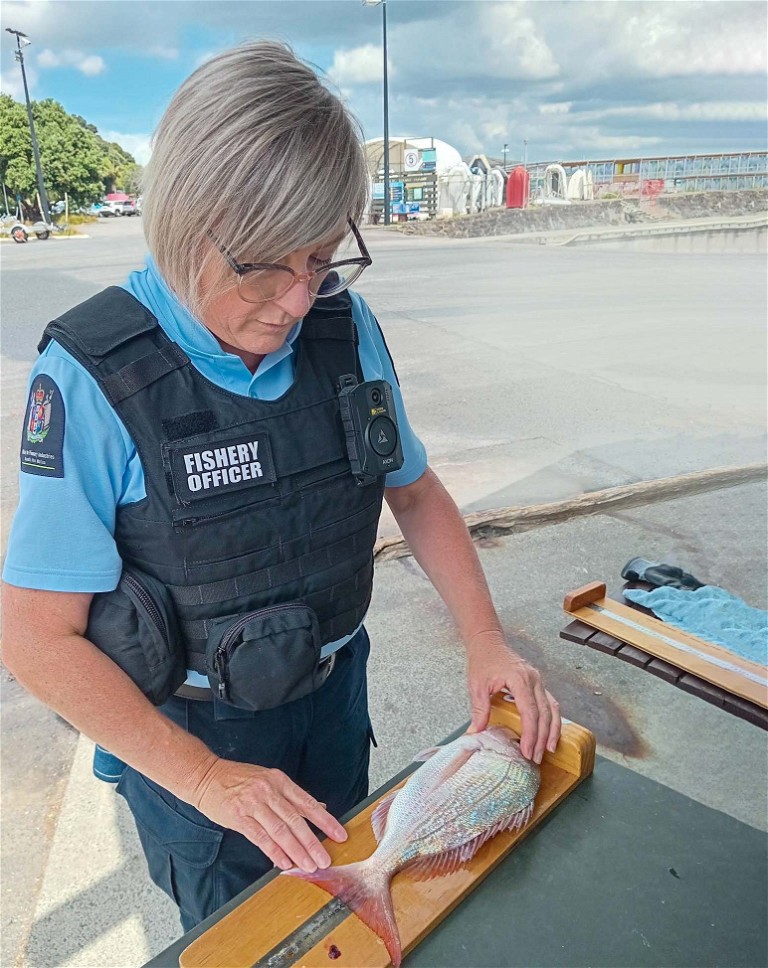WANT TO DO SOMETHING MEANINGFUL?
Find out how a love for fishing and a commitment to do something meaningful led Auckland woman Renee McFadyen to her role as an Honorary Fishery Officer.

Honorary Fishery Officer Renee McFadyen measuring a snapper during patrol.
When the kids have grown up and left home, some parents might consider kicking their feet up, but when Renee McFadyen found herself in that familiar position of being an ‘empty nester’, something out of the ordinary called – becoming an Honorary Fishery Officer (HFO). “I wanted to do something meaningful. I’ve always enjoyed fishing and while visiting the Hutchwilco New Zealand Boat Show, I stopped at the Fisheries New Zealand display, struck up a conversation about protecting fisheries, and it all flowed on from there.”
Renee was warranted as an HFO at Waiheke Island in February this year (2024). She’s based in Papakura and mostly patrols in the southern Auckland area along both western and eastern coasts. “I’m really looking forward to gaining experience in other patrol areas. It’s always good to work with others in the HFO network, see how they operate, and get to know new people.
“When you’re an HFO, it’s all about making sure people are following the rules and regulations that help keep our fisheries sustainable so future generations can enjoy landing fresh kaimoana on the dinner table.”
While she is new to HFO work, Renee has a few fishing yarns to tell, such as her first day out on a coastal patrol.
“I was on my first ride along with an HFO team. We were at the popular Kawakawa Bay and doing inspections at the boat ramp. The patrol was close to ending when we inspected a boat and crew who had a large haul of undersized fish and much more than their daily limit. It was quite overwhelming to see their entire catch laid out on a blue tarpaulin. Alongside a full-time fishery officer, we seized their vessel because it was at the serious end of rule-breaking. This experience told me that my voluntary work is worthwhile and needed.”
HFOs do a minimum of 100 hours of service a year and many volunteers exceed this number, so it’s not an idle commitment by any means.
“When you enjoy what you do, time isn’t really a factor. There’s the initial and ongoing training, but when you break it down over 52 weeks it’s very manageable. Being organised, flexible, and reliable is the key. Also, keeping in touch with other HFOs to arrange patrols is a must-do.”
Life skills come in handy when dealing with fishers, and Renee says it’s all about the approach you take.
“Generally, most people I meet are cooperative. From time to time, you might get some hostility as some fishers might have been fishing all day, are tired, and just want to get home. Staying professional and approaching people with a smile helps break the ice.
“Most people are also aware of the free NZ Fishing Rules mobile app and have it on their phone. Sometimes we deal with people where English isn’t their first language and the visual aids on the app can help in managing these situations. The most common problem we come across is generally undersize fish, so know your rules and I’d encourage all recreational fishers to download the app – you can find details online at fisheries.govt.nz/rules.”
When Renee isn’t working as an HFO, she too likes to go fishing.
“I love it, but like most people I work, and there are never enough hours in the day. When I can, I mostly fish from boats and have landed both kingfish and marlin. I like trying different methods, so I recently bought a surfcaster and I’m looking forward to giving that a go.”
Fisheries New Zealand has around 180 HFOs. If you’d like to consider becoming a voluntary fishery officer, email HFO@mpi. govt.nz